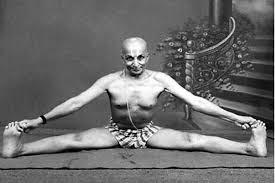
Tirumalai Krishnamacharya
“Relatively few people know my father’s name, though many lives are touched by his work. He never sought personal fame, and rejected all attempts to label him as anything more than Professor T. Krishnamacharya. 'The moment you say you’re a guru, you are not a guru,' he insisted. Similarly, anyone who claimed to be a 'Yogi,' wasn’t.” — T. K. V. Desikachar from Health, Healing, and Beyond: Yoga and the Living Tradition of T. KrishnamacharyaMany years ago I noticed that passage in Health, Healing, and Beyond, and since then I never referred to myself a “yogi” or a “yogini.” That’s because I felt if T. Krishnmacharya didn’t call himself a yogi, I certainly shouldn't presume to call myself one, even though I’ve been called that by others. I figured that the term meant something special, just as the term guru does, so since then I’ve been referring to myself as a yoga practitioner, and in my my own blog posts I refer to our readers simply as yoga practitioners as well.
So I was very interested to read in the new book Yoga Rising: 30 Empowering Stories from Yoga Renegades for Every Body that Lakshmi Nair, an Indian American yoga teacher who studied yoga in India, also never refers to herself as a yogi. It came up when she discussed what it is like for her—as an Indian American and person of color—to teach yoga in the US:
“I felt like I was expected to be an enlightened yogini just because I’m Indian. I’m not enlightened. I’m not a yogi. To me, the word 'yogi' refers to people who renounce material life to live in an ashram or a cave and devote their entire lives to the practice of yoga. I live in the world. I like donuts and Netflix and I have student loans. (And somehow I suspect that even if I changed my name to Satyananadamayi Ma and moved to a Himalayan mountaintop, Salle Mae would still find me.) I, like most everyone else I know, am just a yogabhysi, 'one who practices yoga,' not a yogi, 'one who has realized the state of yoga.' —Lakshmi Nair
That confirmed the instincts I had after reading about how T. Krishnamacharya did not want to be called anything other than “Professor T. Krishnamacharya.” And I felt Nair’s explanation for why this is true for her and must have been true for T. Krishnamacharya was very clear and simple. I’m telling you about this just because I thought maybe if you didn’t know about the meaning of the word “yogi” in India, you might want to be aware of it. I admit I went back and forth about whether I should even bring this topic up because the word “yogi” is so ubiquitous in the West and is used refer to anyone at all who practices yoga or even just attends a few classes per week. And I didn’t want to be seen as policing a lot of people about the language they use. But in the end, I thought that there is no possibility of change if people like me don’t even help encourage a discussion about it.In the meantime, I’m very glad I now I have a good way to refer to myself in Sanskrit that means exactly what I do! After all, not only do I not claim to have realized a “state of yoga,” but my yoga practice is only one part of my life—an important part to be sure, but just a part.And if you’d like to learn more about some of the concerns that Indian American teachers and teachers from India have about how many Westerners teach and practice yoga, I recommend you read the stories of Lakshmi Nair’s entire story in Yoga Rising as well as the stories by Pranidhi Varshney and by Zubin Shroff.Subscribe to Yoga for Healthy Aging by Email ° Follow Yoga for Healthy Aging on Facebook and Twitter ° To order Yoga for Healthy Aging: A Guide to Lifelong Well-Being, go to Amazon, Shambhala, Indie Bound or your local bookstore.For information about Nina's upcoming workshops and retreats and other activities, see Nina's Workshops, Retreats, and Books.

